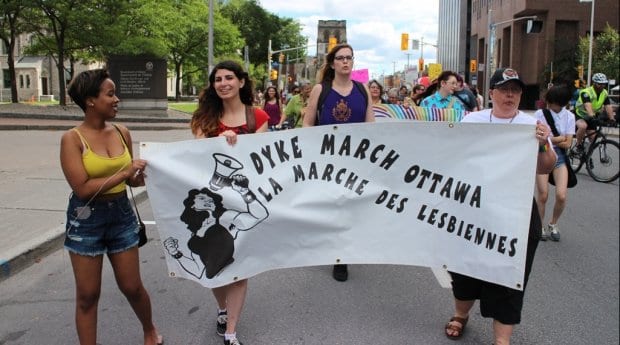Dyke March almost didn’t happen in Ottawa this year.
Melanie Pasztor, a Montreal resident who co-organized Montreal’s Dyke March, scrambled to organize the event when it looked like her hometown of Ottawa wasn’t going to have one.
“We’re small this year, but to me, my goal is to make sure Dyke March happens,” Pasztor said, addressing about 60 people who gathered at the Human Rights Monument in downtown Ottawa on Aug 22, 2015. “The goal of Dyke March to me . . . is to unite all realities of dykes, lesbians and queer women regardless of if you’re cis or trans, regardless of your profession or your age, class, whether you’re from Ottawa or New York City. My goal is to unite and show our solidarity. We exist. We’re visible. We cannot be ignored and we’re proud of who we are.”
Talia Johnson, a trans activist who marched with Trans Lobby Group, also addressed attendees. From LGBT youth homelessness to inadequate access to health care, it’s important to recognize that oppression still exists, she said.
“For me, Dyke March is in large part the political side of Pride,” Johnson said. “Overall [with] Pride, yes we have the celebration. This is about the politics and the activism, recognizing that we still have a lot of work to do.”
Mickeala Guiguere, a Metis woman who was marching in her 10th Dyke March, put a tobacco offering on the ground and acknowledged the march was taking place on Algonquin territory.
“We’re a unique group of individuals — white, black, Native, non-Native — we accept everyone of all cultures,” Guiguere said. “It’s our own march, separate from Pride, to show who we as a people are.”
Gilbert Baker, creator of the rainbow flag, came by to offer his support. Brought to Capital Pride by the Canadian Centre for Gender and Sexual Diversity (CCGSD), Baker has been popping up at Pride events around town and told Daily Xtra he attended the first Dyke March in San Francisco.
“I remember all my guy friends stood on the curb and clapped and cheered as they went by,” Baker said. “It was really beautiful.”
The march started about 30 minutes after its proposed start time to wait for latecomers. Marchers made their way up Elgin Street to Wellington Street, past the Parliament buildings and then down Bank Street to Somerset Street. Onlookers were overwhelmingly positive, smiling, waving and honking horns as marchers went past.
The exception was one male onlooker who decided to engage in street harassment by telling women marchers, “Just don’t bend over.”
“We certainly won’t for you!” A woman responded. The tension was broken and everyone within earshot laughed.
Still, the interaction is indicative of the treatment many queer women face when they’re out on the street with their partners or walking alone, said Julie Lalonde, director of Hollaback! Ottawa.
“It’s really important for us to be visible at Dyke March because women overwhelmingly are the targets of street harassment and that includes queer women,” Lalonde said. “In the conversations about pickup artists in Ottawa over the past couple of months there’s really been a lot of queer women speaking out and saying, ‘I was targeted and I don’t date men, so I don’t like the assumption that any woman outside by herself is waiting to meet a man.’”
In addition to Hollaback!, representatives from the CCGSD also marched and carried a banner.
Although Dyke March didn’t have a permit, two local police officers on bicycles helped navigate the marchers safely through the downtown streets. Pasztor said she considers the march a demonstration, not a parade, so she didn’t feel like she needed permission from the City of Ottawa or police to demonstrate. Despite not having a permit, and being unwilling to tell the police the march route until the last minute, Pasztor said police were amicable.
“Aside from the usual lectures any police [officer] would have to give, there was no hassle,” she said.
The lack of local community members stepping up to organize this year’s Dyke March is likely due to arguments and concerns about a lack of inclusivity, Pasztor said. With a small but diverse event this year, she hopes Dyke March has had a fresh start that will allow people to let go of past disagreements.
“To me, it’s sad that there’s been issues, but at the same time it’s normal,” Pasztor said to attendees before the march. “We’re all going to bump heads and have disagreements. We all have different realities and experiences and come from different backgrounds.”
The march ended with a potluck picnic in Minto Park on Elgin Street.


 Why you can trust Xtra
Why you can trust Xtra


